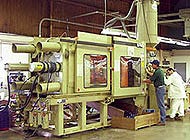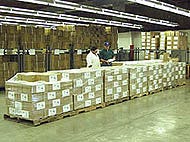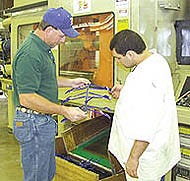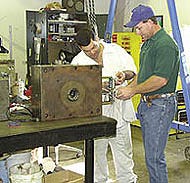December 1, 2001
A metal tray will get your head dented pretty good if you get hit with it."
Could there be any better reason for switching to plastic dinnerware in a prison? Not according to the source of the above statement, Tony D'Cunha, assistant director with Texas Correctional Industries (TCI, Huntsville, TX), the industry sector of the Texas Dept. of Criminal Justice (TDCJ). The Lone Star State's correctional facility not only traded in its metal knives and spoons for polycarbonate, but also decided to mold them itself.
"Texas has always been real high on industry and injection molding is just one of the businesses we're in," says D'Cunha. "We try to be as self-sufficient as we can."
This self-reliant ethic led to the purchase of an HPM 500-ton press nearly 14 years ago to enable the prison to manufacture its own bowls, spoons, sporks, forks, knives, cups, and nonlethal trays for distribution to correctional facilities around the state. In the 2001 fiscal year (ended Aug. 31), 150,000 lb of PC was consumed in the Wynne Unit (short for Wynne Sign & Plastics) where the machine produced 120,000 compartment trays, 192,000 cups, and 1,036,800 utensils.
In addition to self-sufficiency, an obvious benefit of manufacturing within the prison system is the skills offenders acquire. Inmates are put to work two shifts a day in the Wynne Unit, Monday through Friday, with one supervisor employee and four offenders per shift. Training takes about six months on the job. Some mold and machine repair and maintenance are done in-house.
All of this training is part of TCI's Work Against Recidivism, or WAR, in which TCI cooperates with the private sector to find employment for eligible offenders with a clean institutional record. Other industries and manufacturing within this program include printing, cleaning supplies, garments, and metal fabrication.
|
|
Terrey Molnes (left), plastic injection supervisor, examines the Wynne Unit's 500-ton HPM machine for waterline leaks with an inmate. | Finished products are boxed and palletized for shipping to the facility's food service warehouse, where it is distributed to units across the state. |
|
|
Molnes and an inmate inspect molded utensils for defects. | After each job, maintenance is performed on the mold. |
Submissions to Parting Shots are welcome. If you have a favorite sign, saying, quote, or part that is used in this section, we'll send you a check for $25. For our What Is It? series, be sure to identify the part, material, manufacturer, and function. We're also looking for stories about molding ingenuity. Send your submission ideas to Karen Wood, managing editor, fax (303) 321-3552, or e-mail [email protected]. |
You May Also Like






